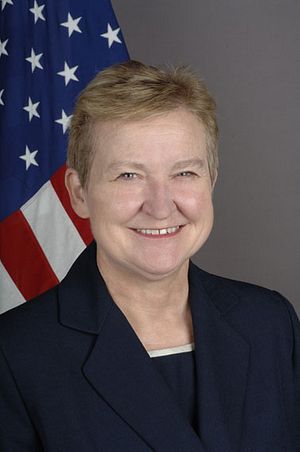The chill in relations between India and the United States continues. U.S. Ambassador to India Nancy Powell resigned on Monday after representing the United States for two years in New Delhi. Her decision to resign was likely in part precipitated by the sharp decline in U.S.-India bilateral relations following the arrest and strip-search of Indian Deputy Consul-General in New York City Devyani Khobragade in December 2013.
State Department spokesperson Marie Harf claimed that Powell’s resignation was unrelated to the tensions between India and the United States. Powell not only resigned from the post of Ambassador – she also retired after a 37-year career in the State Department. The official statement on Powell’s resignation noted that she “expressed her appreciation for the professionalism and dedication of the U.S. Mission to India team who have worked to expand the parameters of the U.S.-India bilateral relationship. She also thanked those throughout India who have extended traditional warm Indian hospitality to her and who have supported stronger bilateral ties.” Harf noted that despite speculation that her resignation was influenced by the dip in U.S.-India relations, “there is not any big behind-the-scenes story here.”
Despite this assertion, Powell’s effectiveness as the United States’ diplomatic envoy did take a hit due to the Khobragade scandal. According to one Reuters source, the Khobragade scandal made it incredibly difficult for Powell to get meetings with important Indian government officials. Even though she had nothing to do with the inception or evolution of the crisis, her position as the face of the United States in India at the time of the scandal caused several members of the Indian government to refuse to deal with her. Powell was likely planning on retiring after her posting to India, but the Khobragade scandal effectively rendered her unable to serve to the best of her abilities.
The Obama administration will likely tap a replacement for Powell soon. The pick will have a large responsibility on his or her shoulders as U.S.-India relations have been deeply affected by the Devyani Khobragade incident. While the incident was mostly unrelated to deeper strategic issues, it exposed the fragility with which India and the United States cooperate. While both countries have important reasons to maintain a close diplomatic relationship, the United States has lost a significant amount of diplomatic mileage with India since December 2013.
Nancy Powell’s appointment to India back in 2012 disappointed some observers who took the White House’s appointment of a career foreign service officer and not a political appointee as a signal that the United States was not interested in developing a closer relationship with India. Should the Obama administration choose to tap a political appointee as a replacement, it would send a powerful signal to New Delhi. Powell’s retirement ahead of India’s general election could also be advantageous for the U.S., which will send a new diplomatic envoy as India changes its government.

































